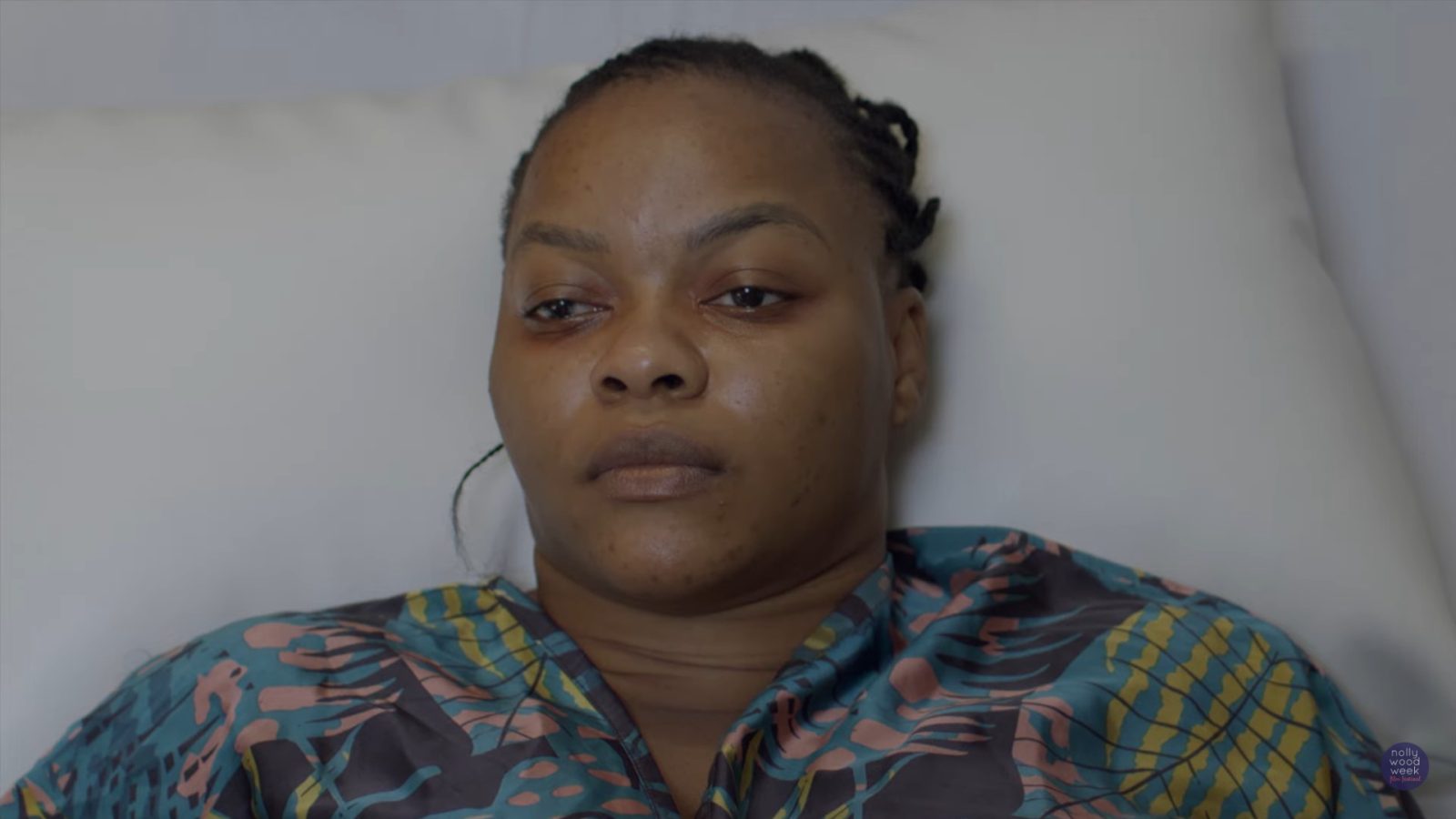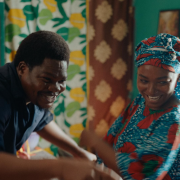Beyond just spotlighting postpartum psychosis, Out in the Darkness rightly wants to aid the audience’s understanding of the condition. But it does not capture that as well as it hopes.
By Vivian Nneka Nwajiaku
If For Maria (Ebun Pataki) (2020) did not exist, Out in the Darkness (2025) might be somewhat revolutionary. Postpartum depression is not very much discussed in Nigeria, so the mere fact that For Maria spotlighted such an important female reproductive health issue earned it some appreciation. But For Maria, Damilola Orimogunje’s debut feature, did more than just spotlight. It told a gripping story with a measured and tight narrative progression, coupled with a breathtaking performance from Meg Otanwa. And it became both a reference and the film to beat, as far the subject matter of postpartum health is concerned.
Out in the Darkness, the directorial debut of writer-director, Sarah Kwaji, explores a slightly different disorder, postpartum psychosis. But at the core, it is practically the same subject matter. That is not to say that we don’t need more films like this; there can never be enough of them. But Out in the Darkness does not get the privilege of being called groundbreaking. Instead, there is a burden placed on it by the existence of its forerunner, one that it does not successfully surmount.
The story is that of Boluwatife (Kehinde Bankole), a new mother suffering deeply after the birth of her baby boy. It’s not that she cannot handle motherhood. She has a pre-teen daughter (played by Darasimi Nadi) who is doing well enough to suggest that she has done a decent job in the recent past. But her experience with her new baby is significantly more daunting. This time, she is dealing with feelings of inadequacy, an irrational fear of impending doom, and vivid hallucinations where her own ghost taunts her.

One intention of Out in the Darkness is to expose the reality of postpartum psychosis and highlight society’s lack of understanding of it. That message does come through. Bolu is afraid of being regarded as a mad woman. Her husband, Nasiha (Deyemi Okanlawon) is a conflicted husband doing his very best to eschew judgment and lessen the burden, but he cannot for the life of him figure out how to help. And both of their mothers (Cassandra Odita and Tina Mba), and Bolu’s best friend (Roseline “Liquorose” Afije), are convinced that Bolu’s problem is spiritual.
Bankole plays the troubled Bolu with perpetual exhaustion and irritability, but also the pretence of a person who is aware that her condition is neither expected nor permitted. There is exhaustion in her steps as she struggles through the motions. She smiles occasionally, but never for real or for long, and you can see her withdraw into herself.
Her ghost is a starkly different person, though. Wardrobe and makeup play up the contrast with colourful outfits and a lipstick redder than that of Zainab Balogun’s eponymous imaginary-friend-made-flesh character in Daniel Oriahi’s psychological thriller, Sylvia (2018). And Bankole portrays her as an aggressive—sometimes jarringly so—and threatening presence. As both versions of the same woman, she renders a satisfactory performance, but it is not Bankole at her best. Her talents still feel untapped here, under-directed.

In fact, untapped potential is a defining trait of Out in the Darkness. Beyond just spotlighting postpartum psychosis, Out in the Darkness rightly wants to aid the audience’s understanding of the condition. But it does not capture that as well as it hopes. Instead, the film unfolds like a list of bullet points where most of the points are just the same idea in different words. And instead of incorporating its message into the story, it postpones its actual insights to its overstretched third act where it becomes a wordy, overly explicit lecture dump that isn’t even giving as much information as the film aims to give.
And so, Out in the Darkness comes off as half-baked while also being repetitive and dragged out. A straightforward plot that should be lean and precise is forcefully overbeaten, and rather than progress vertically, the narrative hops from event to event on a horizontal plane, with Kwaji’s screenplay unable to sustain tension, writing that reflects a weak grip on narrative timing, and a pacing that is both too slow—to the point of drudgery—and too inconsistent.
Part of the film’s problem is that it leans into drama much more than it needs to, and when its subdued tone is already deep-seated. This issue is most evident when Bolu’s mother comes into the picture. In a role that is much more dramatic than that of her mother-in-law role in For Maria, Tina Mba delivers an entertaining performance as an excitable drama queen who misunderstands her daughter’s challenges, with grave consequences. But she features alongside an offbeat second-act plot point involving a stereotypically portrayed White Garment church.
It is a slightly amusing and considerably lengthy sequence that is possibly intended to provide some relief while emphasising the depth of difference between Bolu’s emotional state and the world around her. But it sticks out like a sore thumb, ultimately tampering with the tone and essence of the film.

By the time Out in the Darkness returns to its moody ambience as it proceeds to its heavy climax, what should be a devastating turn of events ends up being anticlimactic, landing weakly on an exhausted audience whose emotions have already changed.
This film should have been a sharper and more resonant work. But like many Nollywood social commentaries, it mistakes importance for skill, unable to translate good intentions into a compelling experience.
The hope is that there will be many more films on subjects like this. But such films need to do more than exist. They need to be unforgettable. Unfortunately, Out in the Darkness is not.
Rating: 2.3/5
*Out in the Darkness premiered at the NollywoodWeek Film Festival on 10th May 2025 and opened in Nigerian cinemas on 4th July 2025.
Vivian Nneka Nwajiaku is a writer, film critic, TV lover, and occasional storyteller writing from Lagos. She has a master’s degree in law but spends most of her time watching, reading about and discussing films and TV shows. She’s particularly concerned about what art has to say about society’s relationship with women. Connect with her on X @Nneka_Viv



